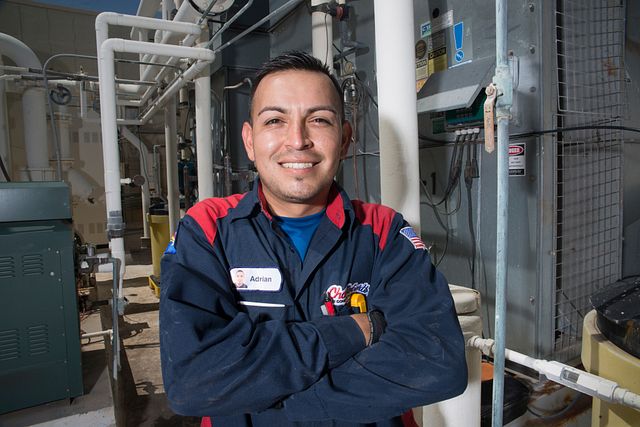TWS is a Great Training Option for Everyone
Learn more about how we can prepare you to advance your career.
High school’s almost over. What’s next?
If you’ve been thinking about pursuing an HVAC career, it’s a good idea to see what the requirements are in your state.
For example, the state of Texas has clear licensing requirements for HVAC technicians. Knowing them can help you and your parents plan your next steps after high school graduation.
See what kinds of HVAC certification you could need to ply the trade in the Lone Star State in this article.
Have You Considered a Career in the Skilled Trades?
Fill out the form to recieve a no obligation info packet.
Do You Need a HVAC License in Texas?
Getting licensed is not a requirement for getting an HVAC job in Texas, butthe Texas Department of Licensing and Regulation (TLDR) handles licenses for Air Conditioning and Refrigeration Contractors.
HVAC License Classes
There are two classes of HVAC licenses:
- Class A: This license allows HVAC techs to work on any size unit.
- Class B: This license allows HVAC techs to work on cooling systems that are 25 tons or less, and heating systems that are 1.5 million BTUs/hour and under.
HVAC License Endorsements
In addition, each HVAC tech must also hold license endorsements, which qualify them for certain types of HVAC contracting. An HVAC tech must be endorsed in one or both of the following focus areas:
- Environmental Air Conditioning: This endorsement qualifies the HVAC tech to treat environmental air controls for temperature, humidity, cleanliness, ventilation and circulation.
- Commercial Refrigeration: The Commercial Refrigeration Endorsement qualifies the HVAC tech to use mechanical equipment to control temperature or humidity in a specific space in a commercial building.
- Process Cooling or Heating: The Process Cooling or Heating Endorsement qualifies the HVAC tech to control temperature, humidity and cleanliness for production and operation of equipment.
NOTE: HVAC techs will need to have either the Environmental Air Conditioning endorsement or both the Commercial Refrigeration and Process Cooling or Heating endorsements. It is possible to have all three endorsements.
Entry-level HVAC workers don’t need a license as long as they are registered with the state as working under the direct supervision of a licensed contractor.
How Do I Get HVAC Certified in Texas?
Every HVAC technician must have EPA certification to work with refrigerants anywhere, including Texas.
You can only get an HVAC license if you meet either of these requirements:
- You’ve worked for at least 48 months under the supervision of a licensed HVAC contractor in the past 72 months.
- You’ve been a Certified Technician for at least 12 months, and you have also worked 36 months under a licensed HVAC contractor.
HVAC Technician Registration vs. HVAC Technician Certification
If you haven’t been working long enough to be eligible for a license, you would need to start by first getting a Technician Registration or Certification.
- HVAC Technician Registration
Technician Registration means simply letting the state know that you are working as an HVAC technician under the supervision of a licensed HVAC contractor. You only need to be 18 years or older to be a Registered Technician. Essentially, as soon as you start working at an HVAC job, you need to register with the Texas Department of Licensing and Regulation.
- HVAC Technician Certification
Technician Certification is optional, but it is a step in between Registration and License. Being a Certified Technician means you have some level of work experience or training. You might have relevant military, on-the-job or HVAC training experience.
EPA HVAC Technician Certification
A federal regulation requires anyone who buys, handles or works with refrigerants to obtain certification from the Environmental Protection Agency (EPA).
How Long Does It Take to Get HVAC Certified in Texas?
- HVAC Technician Registration
To start working as an entry-level Registered HVAC Technician, you would simply need to submit an application, along with the $20 fee, to the Texas Department of Licensing and Regulation (TLDR).
- HVAC Technician Certification
To work as a Certified HVAC Technician, you would need to have completed 24 months of work experience under a licensed contractor, completed an approved technical training program of at least 2,000 hours or have relevant military experience. You would need to contact TLDR to find out about department-approved training programs.
HVAC Training in Houston, Texas
Many HVAC professionals decide to start their training at a vocational school. Tulsa Welding School & Technology Center (TWSTC) in Houston, for example, offers a Refrigeration Technologies program to prepare students for an entry-level job in HVAC (in Texas, this would be a Registered Technician).
The technical training program can be completed in as little as 7 months, but some students may take longer to finish their coursework.
TWSTC’s HVAC Training Program Courses
- Fundamentals of Refrigeration
- Fundamentals of Electricity
- Fundamentals of Solar
- Commercial Comfort Systems
- Residential Comfort Systems
- Advanced Troubleshooting Techniques
- Refrigeration Systems and Practices
Licensed HVAC Contractor
After 4 years of supervised HVAC work experience, registered or certified HVAC technicians would be eligible to take the licensing exams to become an independent HVAC contractor.1 Independent HVAC contractors must also meet the insurance requirements as set out by the state.
Start Your HVAC Training at TWS
If you’re interested in preparing to become an HVAC tech in Texas, reach out to a TWSTC team member anytime to talk about our HVAC training program. Give us a call today.






